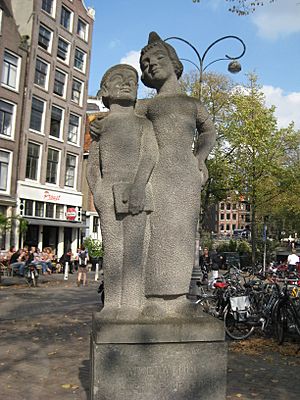Woutertje Pieterse Prijs facts for kids
Quick facts for kids Woutertje Pieterse Prijs |
|
|---|---|
| Country | Netherlands |
| Reward | €15,000 |
| First awarded | 1988 |
The Woutertje Pieterse Prijs (which means Woutertje Pieterse Prize in Dutch) is a special award given every year in the Netherlands. It celebrates the very best children's book published in the year before. It's like a big "well done!" for authors and illustrators who create amazing stories for young readers.
About the Woutertje Pieterse Prize
This award was first given out in 1988. The winner of the prize receives €15,000. This is the largest amount of money given for a children's book award in the Netherlands! The prize is announced every year in March or April.
The award is named after a character called Woutertje Pieterse. This character is from a book called Ideeën by Multatuli. Woutertje Pieterse was known for being very curious. He also liked to think differently from what society expected. Because of this, the Woutertje Pieterse Prijs is given to books that are unique. It celebrates stories that are not just trying to teach a lesson or tell you how to behave.
Some authors have won this award more than once. For example, Toon Tellegen won in 1992 and 1994. Joke van Leeuwen won in 1997 and 1999. Paul Biegel also won twice, in 1991 and 2000. In 2018, Annet Schaap won with her book Lampje. This was special because it was her very first book! Jaap Lamberton is the only person who received the award after he had passed away, in 1993.
Different groups have helped pay for the prize money over the years. These include the Lirafonds and Bruna. The Lirafonds sponsored the award until 2014. Bruna helped in 2015, 2016, and 2017. The awards in 2019 and 2020 were supported by the Brook Foundation and Stichting De Versterking.
Who Has Won the Prize?
Many talented authors and illustrators have won the Woutertje Pieterse Prijs. Here is a list of some of the winners:
- 1988 - Imme Dros, Annetje Lie in het holst van de nacht
- 1989 - Margriet Heymans, Lieveling, boterbloem
- 1990 - Anne Vegter and Geerten Ten Bosch, De dame en de neushoorn
- 1991 - Paul Biegel, Anderland: een Brandaan mythe
- 1992 - Toon Tellegen, Juffrouw Kachel
- 1993 - Jaap Lamberton (awarded posthumously), Een heel lief konijn, written by Imme Dros
- 1994 - Toon Tellegen, Bijna iedereen kon omvallen
- 1995 - Anne Provoost, Vallen
- 1996 - Anton Quintana, Het boek van Bod Pa
- 1997 - Joke van Leeuwen, Iep!
- 1998 - Wim Hofman, Zwart als inkt
- 1999 - Joke van Leeuwen and Malika Blain, Bezoekjaren
- 2000 - Paul Biegel, Laatste verhalen van de eeuw
- 2001 - Bart Moeyaert, Broere
- 2002 - Peter van Gestel, Winterijs
- 2003 - Guus Kuijer, Ik ben Polleke hoor!
- 2004 - Edward van de Vendel and Fleur van der Weel, Superguppie
- 2005 - Thé Tjong-Khing, Waar is de taart?
- 2006 - Harrie Geelen and Imme Dros, Bijna jarig
- 2007 - Harm de Jonge, Josja Pruis
- 2008 - Hans Hagen, Verkocht
- 2009 - Peter Verhelst and Carll Cneut, Het geheim van de keel van de nachtegaal
- 2010 - Carli Biessels, Juwelen van stras
- 2011 - Benny Lindelauf, De hemel van Heivisj
- 2012 - Ted van Lieshout, Driedelig paard
- 2013 - Kristien Dieltiens, Kelderkind
- 2014 - Marjolijn Hof, De regels van drie
- 2015 - Bette Westera and Sylvia Weve, Doodgewoon
- 2016 - Edward van de Vendel and Martijn van der Linden, Stem op de okapi
- 2017 - Gerda Dendooven, Stella, ster van de zee
- 2018 - Annet Schaap, Lampje
- 2019 - Kathleen Vereecken and Charlotte Peys, Alles komt goed, altijd
- 2020 - Bette Westera and Sylvia Weve, Uit elkaar
- 2021 - Benny Lindelauf and Ludwig Volbeda, Hele verhalen voor een halve soldaat
- 2022 - Raoul Deleo and Noah J. Stern, Terra Ultima
- 2023 - Bibi Dumon Tak and Annemarie van Haeringen, Vandaag houd ik mijn spreekbeurt over de anaconda
- 2024 – Tjibbe Veldkamp and Mark Janssen, De jongen die van de wereld hield
- 2025 – Ludwig Volbeda, Oever


